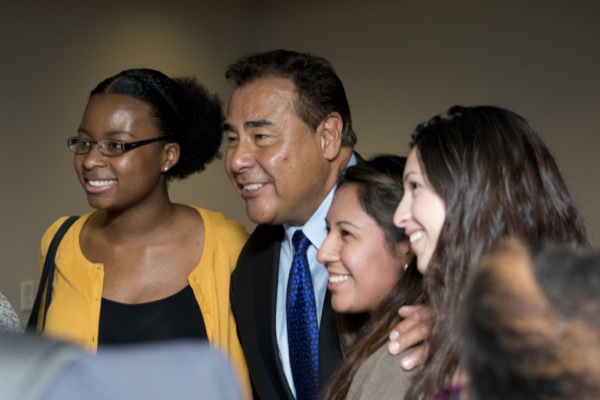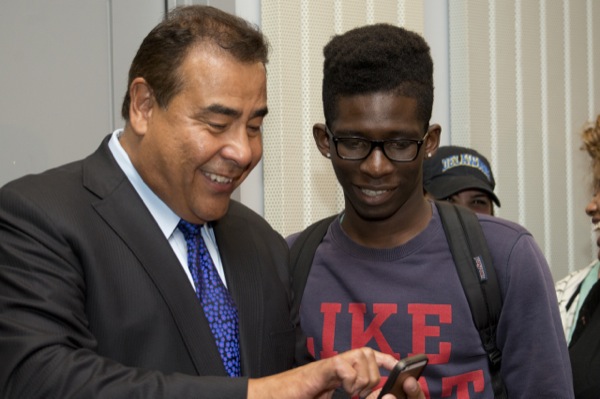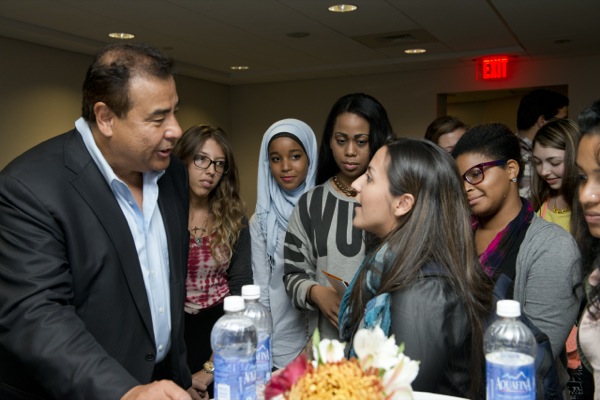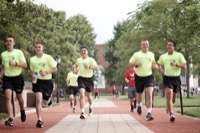

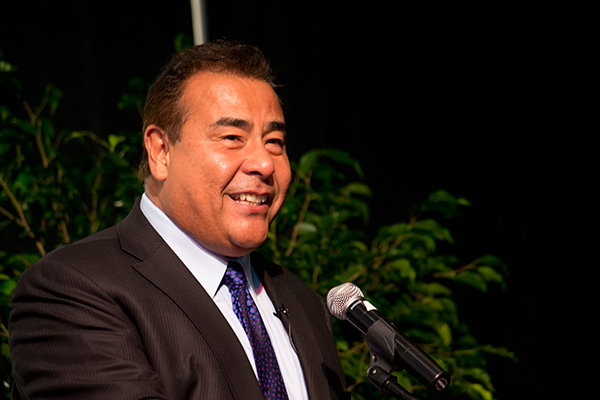
'Take the first step'
ABC's John Quinones tells students to stay focused on their dreams
12:53 p.m., Sept. 19, 2014--ABC’s John Quinones believes that not listening to negative messages and never giving up are the key elements for achieving career success and personal fulfillment.
The Emmy Award-winning journalist shared his journey from a poor, non-English speaking Mexican American child in San Antonio, Texas, to becoming an internationally recognized broadcast journalist during a Latino Heritage Month Extravaganza 2014 talk given Thursday, Sept. 18, in the University of Delaware’s Trabant University Center.
People Stories
'Resilience Engineering'
Reviresco June run
Quinones told the audience of about 450 students and members of the UD and neighboring communities that his journey is part of the long and beautiful history of Latin Americans in the United States.
“I’m Mexican American, and my family has been here for seven generations,” Quinones said. “We were always here. We didn’t cross the border — the border crossed us.”
The first member of his family to attend college, Quinones started school as a six-year-old who didn’t speak English, in a system in which students were punished for speaking in Spanish.
“It was tough,” Quinones said. “The people who see me today have no idea of the long, hard struggle it took me to get from there to here.”
An entrepreneur at age eight, Quinones ran his own shoe-shining business, which he terminated after a gang in the neighborhood robbed him of his hard-earned cash.
At age 13, his father Bruno was laid off from his job as a high school janitor so the family hit the road, traveling 1,600 miles to pick cherries in Michigan at 35 cents a basket.
“It taught me the lesson of a family getting through hard times by working together,” Quinones said. “When we went to Ohio to pick tomatoes, my father said ‘Do you want to do this for the rest of your life, or do you want to go to college?’”
Quinones said that it was his mother Maria who encouraged him when his guidance counselors suggested that instead of thinking about college, he should take metal shop and auto mechanics.
“They saw me as just another Mexican kid who stood no chance of making it,” Quinones said. “No one believed in my dream except my mother. It’s because of her that I just keep journeying on.”
Thanks to an Upward Bound program, Quinones realized his college dream by graduating from St. Mary’s University in San Antonio and later earning a master’s degree from the Columbia University School of Journalism.
Quinones noted that he also drew strength from the life and words of the American civil rights leader, the Rev. Dr. Martin Luther King, Jr.
“Dr. King once said, ‘Take the first step,’” Quinones said. “You might not see the rest of the staircase, but take that step.”
The next step for Quinones was following in the path of reporters like Geraldo Rivera and his heroes Peter Jennings and Walter Cronkite.
“After Columbia University, I went to Chicago and wanted to do a story on immigration, something that was very close to my heart,” Quinones said. “I wanted to see what is was like for people who risk their lives crossing the border from Mexico to the United States.”
Quinones remembered eventually getting the nod from ABC News to cover the wars in Central America and the advice he got from Jennings after informing the ABC News Tonight anchor that a scheduled interview with the president of a nation in that region had been canceled.
“Peter Jennings said, ‘Young man, these things are going to happen. What is important that instead of talking to the movers and the shakers, you talk to the moved and the shaken ones,’” Quinones said. “He also told me that I had the ability to give a voice to people who didn’t have a voice.”
Although Quinones has covered many important stories in Central America and around the world, he is most recognized by a newer generation of Americans as the host of ABC’s What Would You Do?
“People love the show and it resonates with audiences,” Quinones said. “It’s basically a laboratory in human behavior.”
Quinones said that being able to put yourself in the shoes of the people you are covering and telling their story always makes it easier for journalists to do the right thing.
“Don’t give up,” Quinones said. “As long as you are a good storyteller and have a good story to tell, there will always be a person who wants to hear that story.”
The event, which also included a musical performance by Minas com Bahia, was presented by UD’s Center for Black Culture, with support from Campus Alliance de La Raza, HOLA, and the offices of Equity and Inclusion, Residence life and Housing, and Student Life.
For additional information on activities during the Latino Heritage Month and Beyond 2014 celebration, see the poster.
Article by Jerry Rhodes
Photos by Lane McLaughlin




